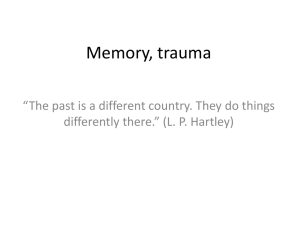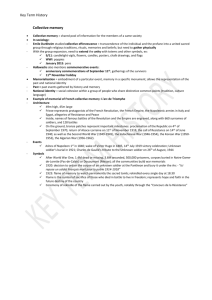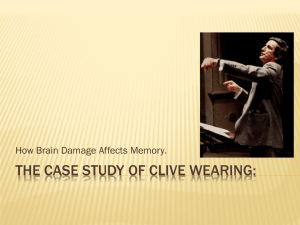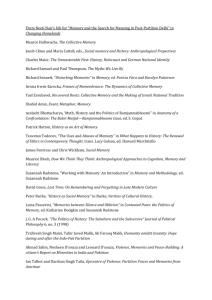Memory, trauma
advertisement
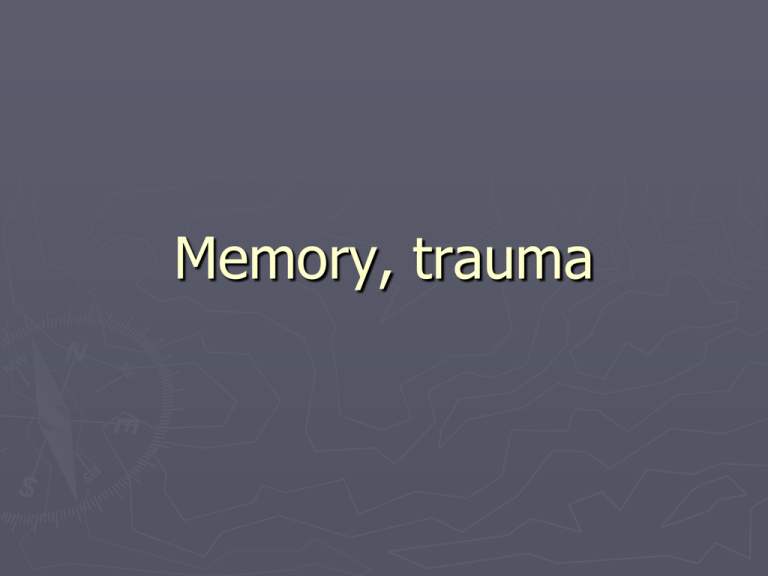
Memory, trauma ► “The past is a different country. They do things differently there.” (L. P. Hartley) ► “You have to begin to lose your memory, if only in bits and pieces, to realize that memory is what makes our lives. Life without memory is no life at all... Our memory is our coherence, our reason, our feeling, even our action. Without it, we are nothing. (Luis Buñuel) ► “Memory is the irruption of other things in us” (Maurice Merleau-Ponty) ► “Only that which never ceases to hurt will stay in the memory” (Nietzsche: The Generalogy of Morals) “The horror of that moment,” the king went on, “I shall never, never forget!” “You will though”, the Queen said, “if you don’t make a memorandum of it”. (Through the Looking-Glass) ► Richard Terdiman: memory is the past made present ► Assmann: The study of memory is interested not in the past as such, but in the past as it is remembered. It is concerned with the paths of handing down, the diachronic continuities of the reading of the past” (Moses) mythology ► Mnemosyne ► Mother of the nine Muses (memory and art) Memory and philosophy ► Epistemological ► Plato: problem MNEME ► “what we call learning is really just recollection” (Phaedo) ► ANAMNESIS: conscious effort to retrieve Plato’s Theaetetus: two models ► (1) block of wax in the mind ► We hold this wax under the perceptions or ideas and “imprint them on it as we might stamp the impression of a seal ring. Whatever is so imprinted we remember and know so long as the image remains, whatever is rubbed out or has not succeeded in leaving an impression we have forgotten and do not know” Plato’s Theaetetus: two models ► (2) aviary stocked with birds Aristotle ► We think only in images ► Time: a linear series of similar presents ► Do we recall the thing or its image? ► Perception and memory (Benjy in The Sound and the Fury) Enlightenment ► Locke, Hume ► storage/retrieval model of memory ► „The power to revive again in our minds those ideas which, after imprinting, have disappeared, or have been as it were laid aside out of sight. ... This is memory, which is as it were the storehouse of our ideas” ► memory as the key to identity Modernity ► Memory becomes a problem for the self ► Wordsworth: ‘Tintern Abbey’ – the sheer difficulty of evoking orf rejoining my past self ► Romanticism: Memory disturbances (grief, nostalgia, split minds) ► Revolution Erinnerung vs Gedächtnis ► Memory as interiorisation, accumulation of experience ► Memory as a mechanical filing system, an archive (José Arcadio Buendía’s ingenious “memory machine” in One Hundred Years of Solitude) ► “Theuth came to the king (Tamus) and exhibited his arts... when it came to writing, Theuth said: ‘This discipline, my King, will make the Egyptians wiser and will improve their memories: my invention is a recipe for both memory and wisdom’. But the king said: ‘...The fact is that this invention will produce forgetfulness in the souls of those who have learned it because they will not need to exercise their memories, being able to rely on what is written, using the stimulus of external marks that are alien to themselves rather than, from within, their unaided powers to call things to mind. So it’s not a remedy for memory, but for reminding, that you have discovered. And as for wisdom, you’re equipping your pupils with only a semblance of it, not with truth. They will be men filled with the conceit of wisdom, not men of wisdom.” (Plato) Phenomenology and memory ► Henri Bergson: motoric memory and image-memory ► Repetition vs representation ► Motor memory becomes HABIT ► Image-memory: intrudes into the present: ► if there is some discontinuity, „immediately these darkened images come forward into the full light” Phenomenology and memory ► Maurice Merleau-Ponty ► “I am never quite at one with myself” “My hold on the past and the future is precarious, and my possession of my own time is always postponed until a stage when I may fully understand it, yet this stage can never be reached, since it would be one more moment, bounded by the horizon of its future, and requiring in turn further developments in order to be understood.” ► Activity and passivity of the past ► “Time arises from my relation to things” ► the present, an „I can” ► “Memory is the irruption of other things in us” ► the arc of memory, of experience ► “It is through the body that we have access to the past” – earlier moments of bodily experience become the history of my current being in the world; time is sedimented on my body (the lived body is a hollow in being, a hollow where time is made) ► „A past that has never been present” Proust: A la recherche du temps perdu ► “It is a labour in vain to attempt to evoke our past: all the efforts of our intellect must prove futile. The past is hidden somewhere outside the realm, beyond the reach of the intellect, in some material object (in the sensation which that material object will give us) of which we have no inkling. And it depends on chance whether or not we come upon this object before we die.” Proust/2 ► „petites madeleines” ► “this old, dead moment which the magnetism of an identical moment has travelled so far to importune, to disturb, to raise up out of the very depths of my being” ► “And suddenly, my memory revealed itself” ► the entire forgotten chapter of his childhood miraculously reemerges, “taking shape and solidity, sprang into being, town and gardesn alike, from my cup of tea” ► the mystique of memory Jean-Paul Sartre ► there has to be a perspective, a subject for a past to exist (objects have no past); the past is produced as the past of this present ► One cannot ʻhave’ a past in the sense in which I have a car: the past is me ► “The past is what I have to be” ► Sich erinnern, se souvenir, se recordar Psychoanalysis and memory ► Hysteria: “patients suffer from remininscences” ► Symptoms: memory symbols Erinnerungssymbole ► The past invades the present ► Hypnosis vs. talking cure Psychoanalysis and memory problems ► (1) Construction of the past – ► (2) archaeological work; alien internal images (dreams, symptoms) ► (3) remembering is dialogic ► (4) transference: remembering/repetition ► (5) the finding of an object is always a refinding (emotional template) ► (6) The temporality of trauma – Nachträglichkeit Psychoanalysis and memory problems ► (7) reinterpretation of forgetting ► Harald Weinrich: “With Freud, forgetting lost its innocence” ► Cui prodest? ► screen memory (Deckerinnerung) 20th century ► Memory: an obsession ► (1) Modernity seen as a memory crisis ► (2) pervades politics, everyday life, popular culture ► (3) emphasis on malfunctionings, memory disorders (amnesia, trauma, nostalgia) ► (4) the idea of collective/cultural memory Pierre Nora: Lieux de mémoire (Sites of memory) ► “The acceleration of history: let us try to gauge the significance, beyond metaphor, of this phrase. An increasingly rapid slippage of the present into a historical past that is gone for good, a general perception that anything and everthing may disappear – these indicate a rupture of equilibrium. The remnants of experience still lived in the warm tradition, in the silence of custom, in the repetition of the ancestral, have been displaced under a fundamentally historical sensibility. ... We speak so much of memory because there is so little of it. Our interest in lieux de mémoire where memory crystallizes and secretes itself has occurred at a particular historical moment, a turning point where consciousness of a break with the past is bound up with the sense that memory has been torn – but torn in such a way as to pose the problem of the embodiment of memory in certain sites where a sense of historical continuity exists. There are lieux de mémoire, sites of memory, because there are no longer milieux de mémoire, real enviroments of memory” Memory vs history Nora: “real memory – social and unviolated, exemplified in but also retained as the secret of so-called primitive or archaic societies” contrasted to HISTORY: the way „our hopelessly forgetful modern societries, propelled by change, organise the past” “History is suspicious of memory and its true mission is to suppress and destroy it” Malfunctionings of memory ► the imperative to remember (an ethics of remembering) and the disinclination to remember ► Richard Terdiman: ► FORGETTTING: things slip away ► HYPERMNESIA: too much to remember + a perverse persistence of recollection ► Too little memory – too much memory ► Baudelaire: ‘I have more memories than if I were a thousand years old’ ‘too much memory’ ► Modern passion for souvenirs ► “The souvenir [Andenken], the withered form of experience, is the complement of the Erlebnis [fully realized experience]. In it is deposited the increasing self-alienation of the person who inventories his past as dead possessions” (Walter Benjamin) WW1 and modern memory ► mourning ► Jay Winter: search for an appropriate language of loss; testing traditional languages of loss (eg. Christian vocabularies and images) ► the attempt to account for, to record, archivise, testify to the slaughter of unprecedented scale, ► the contrary desire to forget ► nostalgia for the prelapsarian war of Edwardian England, ► amnesia, the inability or refusal to remember (the price of resuming civilised existence). ► a catastrophe, a disaster that is also a mnemonic catastrophe, causing an absolute separation from the past ► the cultural and mnemonic emblem of the Great War: the shell-shocked soldier ► Amnesiac yet a memory figure ► Mr Squirrel in W. G. Sebald’s The Rings of Saturn ► Great War and Holocaust memory Memory disorders as cultural metaphors ► mourning : mourning the death or absence (Pascal) of God, and of the Greek gods (Nietzsche: our churches are tombs, monuments of God) ► melancholia (Ross Chambers, Wendy Wheeler, Walter Benjamin: secularisation came too early ► amnesia (Andreas Huyssen: culture of amnesia) ► nostalgia (for the lost age of innocence) ► spectrality (J-M Rabaté, P. Osborne) ► trauma (confronted with an experience that we cannot comprehend) Collective memory ► Ritual ► Athens birth of Erichthonius ► Daughters of Cecrops / disobedience ► 2 little girls: Hersephoroi (bearers of dew) Arrhephoroi (bearers of the unspeakable ► Enactment of a mystery Ritual as collective memory ► Jan Assmann ► repetition and representation ► writing: shifts to representation, from “ritual coherence” to “textual coherence” ► Repetition – representation ► Imitation – interpretation ► Liturgy – hermeneutics Collective memory Margalit:The Ethics of Memory common memory vs shared memory ► Common memory: simply an aggregate ► Shared memory: shared, discussed; comes into existence through communication; ► built of the division of the labour of memory ► Avishai Maurice Halbwachs: Les cadres sociaux de la mémoire (On Collective Memory) ► All memories are individual and collective at the same time ► the individual mind is necessarily imbued with frameworks common to their community. ► It is in the community that we acquire, recall, recognize and localize our memories Memorial places ► Halbwachs: sacred places ► Aleida Assmann: Gedänk(en)ort ► Connection not with god but with the past (making the past transcendent) ► Four types: tomb, ruin, monument, traumatic place Orwell: Nineteen Eighty-Four ► Winston Smith buying a diary ► ‘Nothing remained of his childhood except a series of bright-lit tableaux occurring against no background and mostly unintelligible’ ► Visit to the proles ► ‘The old man’s memory was nothing but a rubbish-heap of details’ ‘transformation of memory into catastrophe’ (Terdiman) Holocaust memory as prototype Difficulties of remembering + political and ethical stakes (witnessing, testimony) Psychoanalytic analogies: - the past is always reconstructed Halbwachs: “the past is not preserved but is reconstructed on the basis of the present” - Internal politics of remembering (censorship, repression, disguise etc) Politics and ethics of memory ► counter-memory (Foucault) resistance against the official versions of historical continuity ► Public spaces, monuments, rituals of commemoration (creation of collective identity) ► Aleida Assmann ► This pillar knows things that I don’t remember (W. Sebald 237) ► Our duty to remember ► Silenced, erased histories, memories Memory, catastrophe, trauma ► Authenticity: ► HISTORY ► MEMORY ► TRAUMA Postmemory (Marianna Hirsch) ► Familial memory ► Art Spiegelman: Maus Eperjesi Ágnes: Family Album Eperjesi Eperjesi Postmodern memory, heritage, retro ► Fredric Jameson: past flattened into a collection of styles ► Heritage: salvaging the past and staging it as a visitable experience. (Bella Dicks)
